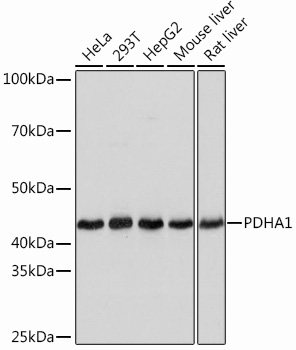Anti-PDHA1 Antibody (CAB13687)
- SKU:
- CAB13687
- Product type:
- Antibody
- Reactivity:
- Human
- Mouse
- Rat
- Host Species:
- Rabbit
- Isotype:
- IgG
- Antibody Type:
- Monoclonal Antibody
- Research Area:
- Metabolism
Description
| Antibody Name: | Anti-PDHA1 Antibody |
| Antibody SKU: | CAB13687 |
| Antibody Size: | 20uL, 50uL, 100uL |
| Application: | WB IF |
| Reactivity: | Human, Mouse, Rat |
| Host Species: | Rabbit |
| Immunogen: | A synthesized peptide derived from human PDHA1 |
| Application: | WB IF |
| Recommended Dilution: | WB 1:500 - 1:2000 IF 1:50 - 1:200 |
| Reactivity: | Human, Mouse, Rat |
| Positive Samples: | HeLa, 293T, HepG2, Mouse liver, Rat liver |
| Immunogen: | A synthesized peptide derived from human PDHA1 |
| Purification Method: | Affinity purification |
| Storage Buffer: | Store at -20°C. Avoid freeze / thaw cycles. Buffer: PBS with 0.02% sodium azide, 0.05% BSA, 50% glycerol, pH7.3. |
| Isotype: | IgG |
| Sequence: | Email for sequence |
| Gene ID: | 5160 |
| Uniprot: | P08559 |
| Cellular Location: | |
| Calculated MW: | 43kDa |
| Observed MW: | 43KDa |
| Synonyms: | PDHA, PDHAD, PDHCE1A, PHE1A |
| Background: | The pyruvate dehydrogenase (PDH) complex is a nuclear-encoded mitochondrial multienzyme complex that catalyzes the overall conversion of pyruvate to acetyl-CoA and CO(2), and provides the primary link between glycolysis and the tricarboxylic acid (TCA) cycle. The PDH complex is composed of multiple copies of three enzymatic components: pyruvate dehydrogenase (E1), dihydrolipoamide acetyltransferase (E2) and lipoamide dehydrogenase (E3). The E1 enzyme is a heterotetramer of two alpha and two beta subunits. This gene encodes the E1 alpha 1 subunit containing the E1 active site, and plays a key role in the function of the PDH complex. Mutations in this gene are associated with pyruvate dehydrogenase E1-alpha deficiency and X-linked Leigh syndrome. Alternatively spliced transcript variants encoding different isoforms have been found for this gene.[provided by RefSeq, Mar 2010] |
| UniProt Protein Function: | PDHA1: a mitochondrial matrix enzyme that catalyzes the oxidative decarboxylation of pyruvate, producing acetyl-CoA and CO2. A key enzyme in controlling the balance between lipid and glucose oxidation depending on substrate availability. The pyruvate dehydrogenase (PDH) holoenzyme is a multi-enzyme complex (PDHC) that contains 20-30 copies of pyruvate decarboxylase tetramers (2 alpha:2 beta)(E1), 60 copies of dihydrolipoamide acetyltransferase (E2), six homodimers of dihydrolipoamide dehydrogenase (E3), plus E3 binding proteins. The activity of PDH is tightly regulated by phosphorylation. The phosphorylation of at least one of three specific serine residues in E1 subunit by PDHK inactivates the PDHC, while dephosphorylation by PDP restores its activity. Sites 1, 2, and 3 of PDHA1 are S293, S300, and S232, respectively. Four PDHK isoenzymes have been described, each with different site specificity: all four phosphorylate sites 1 and 2 but at different rates; for site 1 PDHK2 >PDHK4 >PDHK1 >PDHK3; for site 2, PDHK3> PDHK4 > PDHK2 > PDHK1. Only PDHK1 phosphorylates site 3. PDHA1 deficiency is the most common enzyme defect in patients with primary lactic acidosis. |
| UniProt Protein Details: | Protein type:EC 1.2.4.1; Mitochondrial; Oxidoreductase; Carbohydrate Metabolism - butanoate; Amino Acid Metabolism - valine, leucine and isoleucine biosynthesis; Carbohydrate Metabolism - pyruvate; Carbohydrate Metabolism - citrate (TCA) cycle; Carbohydrate Metabolism - glycolysis and gluconeogenesis Chromosomal Location of Human Ortholog: Xp22.1 Cellular Component: mitochondrial matrix; mitochondrion; nucleus; pyruvate dehydrogenase complex Molecular Function:pyruvate dehydrogenase activity Biological Process: acetyl-CoA biosynthetic process from pyruvate; glyoxylate metabolic process; pyruvate metabolic process; regulation of acetyl-CoA biosynthetic process from pyruvate; tricarboxylic acid cycle Disease: Pyruvate Dehydrogenase E1-alpha Deficiency |
| NCBI Summary: | The pyruvate dehydrogenase (PDH) complex is a nuclear-encoded mitochondrial multienzyme complex that catalyzes the overall conversion of pyruvate to acetyl-CoA and CO(2), and provides the primary link between glycolysis and the tricarboxylic acid (TCA) cycle. The PDH complex is composed of multiple copies of three enzymatic components: pyruvate dehydrogenase (E1), dihydrolipoamide acetyltransferase (E2) and lipoamide dehydrogenase (E3). The E1 enzyme is a heterotetramer of two alpha and two beta subunits. This gene encodes the E1 alpha 1 subunit containing the E1 active site, and plays a key role in the function of the PDH complex. Mutations in this gene are associated with pyruvate dehydrogenase E1-alpha deficiency and X-linked Leigh syndrome. Alternatively spliced transcript variants encoding different isoforms have been found for this gene.[provided by RefSeq, Mar 2010] |
| UniProt Code: | P08559 |
| NCBI GenInfo Identifier: | 129063 |
| NCBI Gene ID: | 5160 |
| NCBI Accession: | P08559.3 |
| UniProt Secondary Accession: | P08559,Q53H41, Q5JPT8, Q9NP12, Q9UBJ8, Q9UBU0, Q9UNG4 Q9UNG5, A5YVE9, B2R5P7, B7Z3T7, B7Z3X5, |
| UniProt Related Accession: | P08559 |
| Molecular Weight: | 47,580 Da |
| NCBI Full Name: | Pyruvate dehydrogenase E1 component subunit alpha, somatic form, mitochondrial |
| NCBI Synonym Full Names: | pyruvate dehydrogenase (lipoamide) alpha 1 |
| NCBI Official Symbol: | PDHA1 |
| NCBI Official Synonym Symbols: | PDHA; PDHAD; PHE1A; PDHCE1A |
| NCBI Protein Information: | pyruvate dehydrogenase E1 component subunit alpha, somatic form, mitochondrial |
| UniProt Protein Name: | Pyruvate dehydrogenase E1 component subunit alpha, somatic form, mitochondrial |
| UniProt Synonym Protein Names: | PDHE1-A type I |
| Protein Family: | Pyruvate dehydrogenase E1 component |
| UniProt Gene Name: | PDHA1 |
| UniProt Entry Name: | ODPA_HUMAN |





